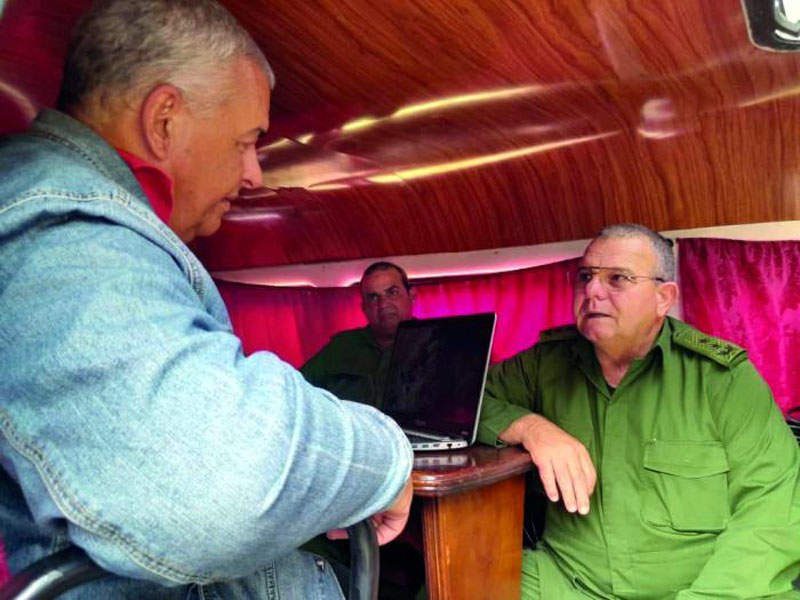In the face of pain, courage and responsibility
- Written by Germán Veloz Placencia
- Published in Holguin
- Hits: 1080

If the grief and pain for the 13 missing combatants due to the explosions occurred in areas of a military unit located in the territory of Melones, municipality of Rafael Freyre, is deep, here there is also talk of the rapid evacuation of the inhabitants of areas surrounding the sites of the accident.
Upon his arrival at the site, the head of the National Staff of Civil Defense, Major General Ramón Pardo Guerra, evaluated the event as a technological disaster, the causes of which are still being investigated.
"Timely action was taken to protect people at risk. These were minutes of joint work by the Provincial, Municipal and Zone Defense Councils, with the cooperation of the FAR combatants and the Ministry of the Interior."
Pardo Guerra also commented that he spoke with some of the relatives of the missing persons. "In the midst of their pain, they recognize the information offered and the progress of the investigations to clarify the event. We are all saddened by what happened," he said.
THERE WAS NO POPULATION LEFT IN THE DANGER ZONE
Yesterday afternoon, a group of local journalists had access to the closest possible areas to the underground works that were destroyed. Columns of smoke still crowned several elevations.
According to information provided by officials of the Eastern Army, surveillance is constant with the use of various means, including unmanned aerial vehicles (drones). The sources stated that since early Wednesday morning no explosions were reported.
The journalists made the route to those places, accompanied by Alexander Peña González, president of the Defense Council of the Melones Zone, in the demarcation of the same name, who said that more than 490 residents in the rural district of Sao Redondo were transferred to safe places.
Manuel Marrero Meneses, president of the People’s Council of Melones, spoke about the rapid development of the warning and the evacuation of compatriots. He also highlighted the creation of peasant brigades that together with forces from the Ministry of the Interior, were still guarding the houses with the belongings of those transferred to evacuation centers and protected in the homes of relatives and friends.
Yamilé Suárez Serrano is one of the 130 people transferred to the Manuel Rojo Polytechnic. She offered details of the evacuation process because her house, in Sao Nuevo, served as a Management Post. Her daughter Leanet is the People's Power delegate in the area.
«After the first explosion, she began to inform the neighbors that they should be ready to leave the place. A little while later, around two in the morning, members and main leaders of the Municipal Defense Council arrived, and the warning was already put into effect. Later, the means of transport arrived. The first to be evacuated were the elderly, children and pregnant women.
"In the morning, together with the residents of the other communities, we were already gathered at the Melones tobacco factory, with all the necessary security," she explained.
JUSTIFIED RECKLESSNESS
The main leaders of the Eastern Army and the Military Region of Holguín have been in the most dangerous zone from the very beginning, as well as Joel Queipo Ruiz, member of the Central Committee of the Communist Party of Cuba and first secretary of the organization in the territory, and Manuel Hernández Aguilera, governor of Holguín, as well as the members of the Municipal Defense Council and other local authorities.
There are several evidences of this permanence in the front line. For example, Alexis Deiggs Gómez, president of the Municipal Assembly of People's Power, bears on his forehead, between his eyes, the mark of the impact of a fragment of glass from the first large explosion that occurred in the Military Unit.
He said that, together with the head of the Eastern Army, Major General Eugenio Rabilero Aguilera, and the other members of the Municipal Defense Council, they had reached the vicinity of a burning silo, where the military chief explained to them the magnitude of the danger that threatened the residents in the vicinity and the need to carry out a rapid evacuation.
The shock wave of the explosion – he described – hit them all, throwing them to the ground in the middle of a cloud of particles, dirt and dust that flew in all directions. After receiving the prompt and necessary medical attention, and verifying that they did not suffer serious consequences, they continued working.
When asked about the attitude of not ceasing at that time the actions in the vicinity of the risk zone, he simply responded that the circumstances and duty demanded it.
